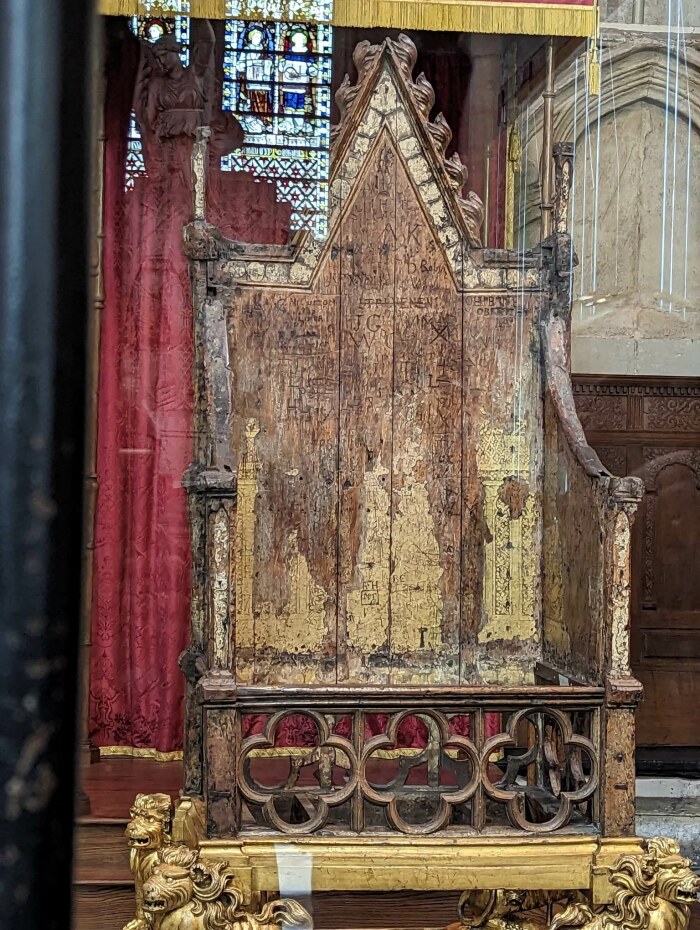Ira Lacher reports from London in advance of the coronation of King Charles III.
With just days before the coronation of King Charles III, perhaps the enthusiasm in London for the royal shindig has increased over what it seemed when my wife and I, along with our son and daughter-in-law, visited London early in April: a combination of normal, hassled, and indifferent.
The weather was normal: cool, breezy with occasional rain every day. Prices, escalating since the Brexit-resulting falloff of the pound ($1.20 USD), were normal, which was to say high. Crowds, especially in the shopping destinations of Leicester Square, Piccadilly Circus, Soho, and in the West End theater district, were normal, which was to say mobbed, since most European schools were on spring break.
And British gentility was normal, which, to American ears, is totally quaint, such as in the elevators (“This is a lift going down,” advised a female voice straight out of Downton Abbey; “watch the closing doors”) in our hotel, steps away from Westminster Abbey, where on May 6 the king will be crowned, as did countless kings and queens over the last thousand years or so.
A sense of additional hassle pervaded, thanks in part to the temporary viewing stands, which closed several streets near the abbey and the nearby Houses of Parliament, turning nearby 10-minute Uber destinations into odysseys, much to the consternation of the drivers, many in their new EV vehicles. Parliament Square also was cordoned off. And then there were the normal hassles, such as the closing of the British Museum for several days owing to “industrial actions in the public sector” (labor strikes).
But mostly there was indifference. While every souvenir shop from Soho down to Brighton was stocked to the rafters with all sorts of coronation trinkets, it was hard to find a native who cared about the event. There was more of a feeling of “Yeah, we’re having a coronation, but d’ya believe how poorly Tottenham are doing in the Premier League”? A YouGov poll released in mid-April disclosed that only about a third cared about the coronation “a great deal” or “a fair amount,” while two-thirds of respondents cared “not very much” or “not at all.”
In fact, upon returning home, we noted that the coronation seemed more a thing with the U.S. media: from CBS News’ breathless report on whether Meghan will attend the ceremony (she won’t), to Fox News’ disclosure of Tom Cruise’s ties to the royals, to The Washington Post’s exclusive on how to make the royal quiche. I mean, isn’t this why we rebelled against England?
Edward Elgar may have composed “Pomp and Circumstance,” but it is surprising how little enthusiasm there seemed to be when Britain has seen nothing like it in 70 years, longer than the average Briton has been alive.
Perhaps the ennui can be explained because spending an estimated 100 million taxpayer pounds seems like the royal scepter’s poke in the eye to commoners now coping with the highest inflation rate in 40 years. Anecdotally, many immigrants, disgusted with the high prices and taxes, as well as the government’s inability to ease the burden, plan to abandon Britain and return home. “I’ve been here 22 years,” Tabor, an Uber driver told us one evening, “and this is the worst I’ve ever seen. I will be returning to Romania in July.”
Nevertheless, with days to go before the festivities, including a national day off on Monday, May 8, maybe the enthusiasm is growing. I will at least record the four-hour TV show since I’ve never seen a coronation (although I expect to see another in my lifetime, considering Charles, at 74, is the oldest British monarch at ascension). But will fewer Britons care when heir apparent Prince William, whose approval rating is 10 points higher than his sire, ascends to the throne? In the latest survey by the UK’s National Centre for Social Research, 45 percent considered the monarchy not very important or even worthy of abolition.
Between the COVID-19 pandemic, the awakening to its sordid reputation as a brutal colonizer, and the social and economic repercussions of Brexit, it hasn’t been, as native son Charles Dickens famously described, “the best of times” for Britain. Those planning this gaudy celebration of arguably anachronistic royalty are hoping to impress upon the British public that these are hardly “the worst of times.”
If the folks across the pond need a unifying event, they could do worse than the many antiquity-swaddled trappings of coronation. At the very least, they can take satisfaction that the chairs in their flats are probably far more comfortable than the one King Charles will need to sit in. It’s 723 years old.
Top photo by Ira Lacher of the coronation chair, which was on display in Westminster Abbey.


1 Comment
Did you...
ride the London Eye? If so, hope it was an unusually clear day.
Fly_Fly__Fly_Away Fri 5 May 3:57 PM